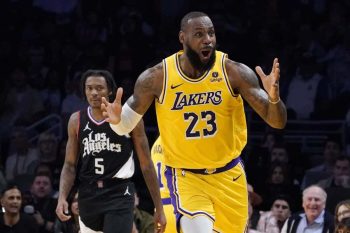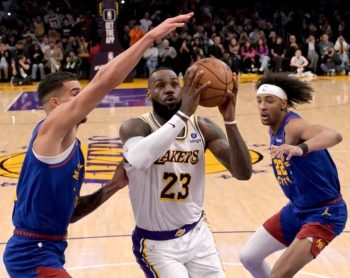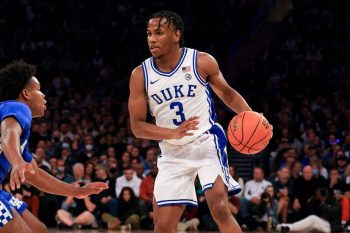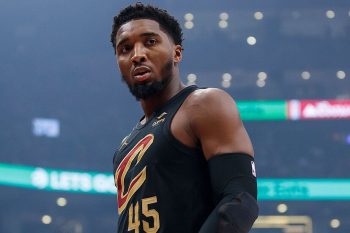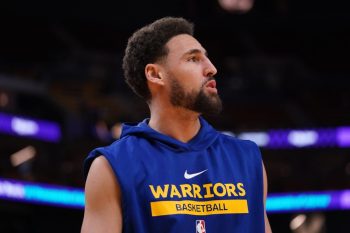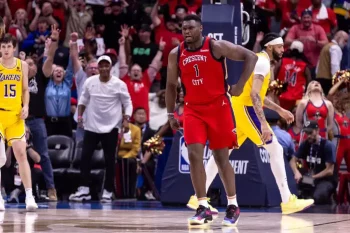NBA
One on One: Hall of Famer Alonzo Mourning
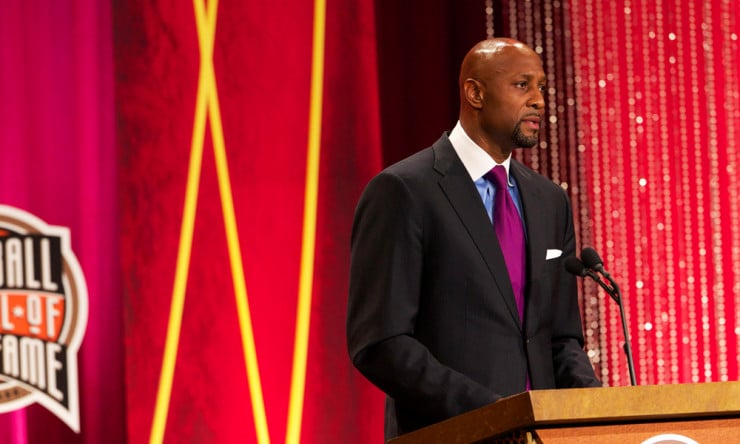
One on One With NBA Hall of Famer Alonzo Mourning
Alonzo Mourning had a hell of a professional basketball career.
Mourning dominated at every single level. At Indian River High School in Virginia, he averaged 25 points, 15 rebounds and 12 blocks during his senior year. At Georgetown, he averaged 21.3 points, 10.7 rebounds and five blocks in his final year. The Charlotte Hornets liked what they saw, and selected him with the No. 2 overall pick in the 1992 NBA Draft (one pick after Shaquille O’Neal).
Expectations and pressure were high when he entered the NBA, but he certainly lived up to the hype. As a rookie, he took the league by storm, averaging 21 points, 10.3 rebounds and 3.5 blocks. Then, during his prime, Mourning was virtually unstoppable – at one point averaging 23.2 points and, for several years, blocking nearly four shots per game.
When Mourning’s 15-year NBA career came to end, his averages were an impressive 17.1 points, 8.5 rebounds and 2.8 blocks on 52.7 percent shooting from the field. He would become a seven-time All-Star, All-NBA First Team selection, two-time Defensive Player of the Year, world champion, gold medalist and Hall of Famer. He solidified himself as one of the most dominant and intimidating interior forces in league history, blocking 2,356 shots during his career (the 11th-most rejections of all-time).
Since retiring after the 2007-08 season, Mourning has transitioned into a front office role with the Miami HEAT, working as the Vice President of Player Programs and Development for the franchise.
He has also done a lot of charity work to benefit his community, founding Alonzo Mourning Charities, Inc. to help at-risk children, Zo’s Fund for Life to raise money and awareness for focal glomerulosclerosis (the kidney condition he battled) and Athletes For Hope to encourage more professional athletes to get involved in doing charity work. His latest project is the Dove Men+ Care’s “Real Strength Moments” campaign, which attempts to redefine strength as being caring and nurturing among other things.
Basketball Insiders recently chatted one on one with Mourning to discuss his career, the current big men in the NBA, his thoughts on the Final Four, his pick for Most Valuable Player and much more.
Alex Kennedy: How are today’s big men in the NBA different from the big men when you played?
Alonzo Mourning: In today’s generation, you’ve got more multi-skilled centers. The back-to-the-basket centers, they’re like dinosaurs. There aren’t many of them left – only like two or three of them. Now, they’re face-up, jump-shooting big men and there’s been a tremendous evolution at the position because the game isn’t taught inside-out anymore. It’s taught that it’s more a perimeter-oriented game.
Kennedy: You were a monster as a rookie, but we often hear that the development of a big man in the NBA takes longer than the development of other positions. Why is that? Does it have to do with the big man coaching at the high school or college level?
Mourning: That’s it. You got it. That’s it. It’s the coaching at the high school and college level. I had excellent coaching, I really did. And when you have that kind of influence and any sense of a basketball IQ, you adapt. You adapt immediately. Those things make all of the difference in the world. I was very fortunate to have that [big man coaching and basketball IQ]. I also had the work ethic. You know that I was an undersized center, but I played like I was 7’0.
Kennedy: How dominant would you be today if we put prime Zo on an NBA team and made you the focal point?
Mourning: Oh my God. It’d be unreal. Unreal. Because first of all, with the way that the game is being called, it’s not as physical of a game anymore. I would have shot at least five to seven more free throws per game because I used to see a lot of contact. So I would say that I would average anywhere from 22 to 25 [points] per game.
Kennedy: This may be a strange question, but what was it like stepping onto the court every night and feeling virtually unstoppable? You were often the best player on the floor and many nights you did whatever you wanted. What’s that feeling like?
Mourning: It just gave me a certain confidence. Every time, I stepped on the court, I wasn’t to be denied. It just came down to [me] basically forcing my will on my opponent. That’s pretty much what it came down to. I basically just forced my will on my opponent and not too many of my opponents could deal with it or get in my way.
Kennedy: Who were the players who gave you the most trouble during your playing career, in terms of guarding you or getting in your head?
Mourning: People who gave me trouble? Oh wow. Hmm, I think it’d have to be Hakeem Olajuwon. He gave everybody trouble.
Kennedy: What’s it like when that feeling of dominance starts to slip away due to aging, injuries and other circumstances? I know a lot of athletes really struggle with that. Kobe Bryant is a recent example. What’s that like?
Mourning: Father Time is undefeated, man, so you just deal with it and move on. You just try to make the proper adjustments that you need to make. You can see that with Kobe Bryant right now. You see injuries are just becoming a part of [him]. Your body just starts to break down. A lot of people fail to realize that we’re not machines. We may look like it sometimes, but we’re human beings too. Over time, things just start breaking down. To us too! It’s part of the norm. As much as we’re mentally strong and we feel like we can still perform, eventually everything just gives out on you. You aren’t as durable as you were when you were 20 or 22 years old. You just aren’t as durable when you get to be 37 or 38.
Kennedy: I know this Dove Men+ Care’s “Real Strength Moments” campaign focuses partially on resilience. You epitomize that, with the health issues you overcame. What was it like going through that at the time, and did you fear for your life?
Mourning: I didn’t fear for my life, but I did have a lot of doubt, wondering if my life would be shortened by this thing. I just continued to educate myself on the situation, surround myself with the right people, change my diet, make the right adjustments, continue to exercise and do all of the things I could to overcome it rather than succumb to it. Outside of all of that, I was fortunate to receive a life-saving transplant from one of my relatives, Jason Cooper.
Kennedy: What did it mean for you to put the cherry on top of your illustrious career by winning a championship with Miami in the 2006 NBA Finals after you had the kidney transplant?
Mourning: It was probably one of the most fulfilling moments of my career to be able to do that. Because I just feel like that’s the pinnacle of everybody’s career, to be able to win a world championship, whether that’s at baseball, football, basketball, any sport. So when I had the opportunity to do it, I just seized it. I seized the moment. I had to make some sacrifices in order to get there, but it happened for me.
Kennedy: Of all the centers in the NBA today, who are some of the guys who impress you the most?
Mourning: Are there any centers that stand out to me right now? The only one I can think of is Anthony Davis. He plays like I used to play when I was a rookie – blocks shots, rebounds, gets assists, scores points – he fills up the stat sheet. He’s just all over the place.
Kennedy: Who would be your NBA Most Valuable Player for this season?
Mourning: My MVP award right now would go to Anthony Davis. That’s who I’d vote for. I think he is [overlooked to a certain extent], and I think [his] market has kind of affected him. But yeah, Anthony Davis would definitely get my vote for MVP.
Kennedy: Your front office in Miami has made some great moves this year, and I want to ask you about Hassan Whiteside. You’ve been mentoring him. What are your thoughts on his growth and how have you been trying to help him?
Mourning: I’m just trying to help him reach his [full] potential, what it takes to get there as far as developing his game and developing his work ethic and what have you. He’s been given the God-given abilities and now it’s time for him to develop the work ethic this year.
Kennedy: You’ve been working in Miami’s front office. Do you aspire to lead your own team as a general manager someday?
Mourning: I’m a front office executive now, one of the vice presidents of the team, but I don’t know yet [about wanting to become a GM]. That’s a pretty good question for me. I really don’t yet, I can’t really give you a solid answer if that’s something that I want to do. Right now, I’m happy with where I’m at and how I’m contributing to the team.
Kennedy: How much have you learned from Pat Riley in Miami?
Mourning: He’s the perfect mentor when it comes to that. I’ve learned so much from him so far and he’s the perfect mentor for me.
Kennedy: Shifting gears to college basketball, which team do you have winning the NCAA Tournament this year? Can any team compete with Kentucky?
Mourning: I don’t know [if any team can beat Kentucky], but you have to think that Wisconsin has a very well-balanced team. It’s a toss-up. You really don’t know. It’s going to be fun to watch. I’m telling you, I don’t think one team is just going to overwhelm the other. I mean, look at the Notre Dame vs. Kentucky game. You just never know. Now, if Kentucky had blown Notre Dame out, I’d probably say different. But now, you just don’t know. I think Wisconsin is a better team than Notre Dame, I really do. … I’m just very pleased to see this great level of competition and I think it’s going to be a great Final Four.
Kennedy: What made you decide to do this Dove Men+ Care’s “Real Strength Moments” campaign?
Mourning: First of all, I use the product Dove Men+Care and outside of that, part of the campaign is just helping people understand what strength is. I’ve been looked at as being the definition of strength with my physical stature. But true strength is defined by nurturing, caring, being a father to your children and being a leader in your community. We were taught when we were younger that strength is just about sucking it up and being aggressive and being strong, but times have changed. The mentality of strength has changed tremendously.
For more on the Dove Men+ Care’s “Real Strength Moments” campaign, watch this video about NCAA Tournament Tales. For more information on Mourning’s foundations and events, click here.
